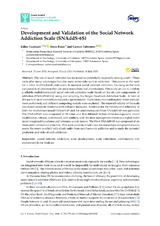Development and Validation of the Social Network Addiction Scale (SNAddS-6S)
Autor
Cuadrado, Esther
Rojas, Rocío
Tabernero Urbieta, Carmen
Editor
MDPIFecha
2020Materia
Social network addictionScale development
Scale validation
Confirmatory and exploratory factor analyses
METS:
Mostrar el registro METSPREMIS:
Mostrar el registro PREMISMetadatos
Mostrar el registro completo del ítemResumen
The use of social networks has increased exponentially, especially among youth. These tools offer many advantages but also carry some risks such as addiction. This points to the need for a valid multifactorial instrument to measure social network addiction, focusing on the core components of addiction that can serve researchers and practitioners. This study set out to validate a reliable multidimensional social network addiction scale based on the six core components of addiction (SNAddS-6S) by using and adapting the Bergen Facebook Addiction Scale. A total of 369 users of social networks completed a questionnaire. Exploratory and confirmatory factor analyses were performed, and different competing models were explored. The external validity of the scale was tested across its relations with different measures. Evidence for the validity and reliability of both the multidimensional SNAddS-6S and the unidimensional Short SNAddS-6S was provided. The SNAddS-6S was composed of 18 items and five different factors (time-management, mood modification, relapse, withdrawal, and conflict), with the time-management factor as a higher-order factor integrated by salience and tolerance as sub-factors. The Short SNAddS-6S was composed of six items and a unifactorial structure. This scale could be of relevance for researchers and practitioners to assess the extent to which individuals suffer from social network addiction and to study the potential predictors and risks of such addiction.

